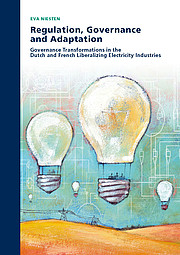Regulation, Governance and Adaptation: Governance transformations in the Dutch and French liberalizing electricity industries Defended on Thursday, 11 June 2009
For more than a decade, the European governments have focused their energy policies on creating one European competitive electricity market. Several regulations are introduced into the European electricity industries for this purpose: the energy firms have to unbundle the electricity networks from electricity generation and retail, and the consumers should be able to choose their electricity retailer. This thesis analyses which new governance structures emerged in the Dutch and French electricity industries as a result of these regulations for four types of electricity transactions: the network connection, network access, balancing and switching transactions. The parties in these electricity industries did not adopt a market, but hybrid forms of governance that remained extensively regulated. The efficiency of these new governance structures cannot be explained with the attributes of the transactions, as is proposed by transaction cost economics. This thesis therefore introduces the concept of adaptation into transaction cost economics. Adaptation is the adjustment by economic actors from one governance structure to another, and is characterized by three attributes: the identity of the future contracting party, the laterality of the adaption, and the type of response in the adaptation process. These attributes explain the governance transformations and the new governance structures in the two industries. Regulation continues to play a pervasive role in the liberalized electricity industries. It influences the attributes of the transactions, the new governance structures and the adaptation process.
Keywords
regulation, institutions of regulation, governance structures, governance transformations, adaptation, transaction cost economics, liberalization, electricity industries












